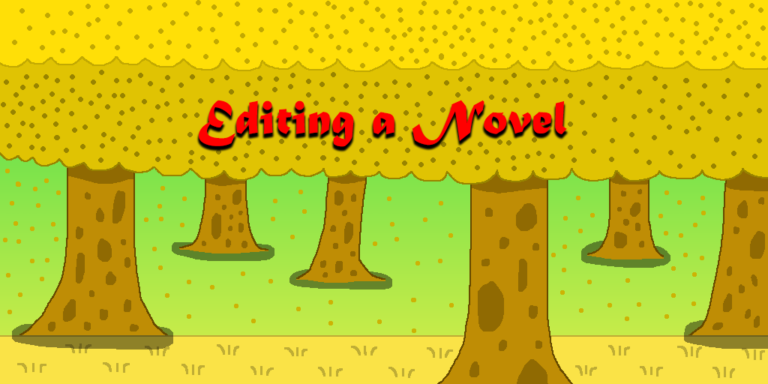Join US
Do you want to build the fantasy world you’ve always dreamed of?
Subscribe to receive notifications when a new post is out and for our monthly newsletter!
You can always unsubscribe anytime.


With a resolute determination to be a published author, you’ve successfully written a novel after months of hard work. After that, you took a well-deserved break and now you’re itching to get back in the saddle but you have no idea what to do. The next step is to start editing a novel.
Editing a novel sounds so simple, doesn’t it? You simply re-read your novel from the beginning to the end to catch minor mistakes like a comma instead of a period or a word typed wrong and you call it a day. No, it’s much more than that. The editing process is designed to help you identify what spots that need to be worked on so you can make your novel better.
While we’ll delve more into what to do when editing a novel, we’ll start off with one of the most common reasons why you’d edit your work: grammar. Believe it or not, when you’re working on your first draft, you’re concentrating on putting your thoughts on paper and using correct grammar is but a distant memory. When you re-read it for the first time since completing it, you want to keep your eyes peeled for grammatical errors and you’ll find more than you expected!
Another thing to be mindful of when editing is to be consistent in several areas. Prose, the feel of the story, how scenes flow into each other, and so on are important considerations to take into account as you go through your novel. It’s vital that all these elements work together in perfect harmony to make a scintillating plot that your readers love!
Editing a novel isn’t an one-time thing. You’ll have to do it multiple times since you’ll catch some things you missed before which is always a positive! You want your novel to be the best it can be and doing multiple rounds of editing goes a long way in accomplishing that!
This is article number forty-one in the series focusing on writing a fantasy book. Want to check out what others we have? You can find them on our blog page!
Editing is tremendously helpful since it helps you with one problem every writer has: grammatical errors. You’ll be surprised at the number of errors you made as you wrote the first draft of your novel. If you happen to know someone who wrote the first draft without making any grammatical errors, let me know. I’d love to meet them!
As you re-read your novel, keep an eye out on common errors like the wrong punctuation. Occasionally you might have inadvertently placed a comma where there shouldn’t be one. Also pay close attention to colons and semicolons; it’s easier than you think to mix them up. Fix them as needed.

Fixing the punctuation is the easiest part of the grammatical component of editing a novel. The more difficult part is the syntax. You have to to ensure that every word you use serves your novel well. Those that don’t are called filler and you want to eliminate them immediately since they contribute nothing to the plot.
You also have to examine the length of not just your sentences but your paragraphs as well. Are they straight to the point or do they meander unnecessarily? Readers love it when you use as few words as possible to move the story along, whether you’re describing something or showing the actions your characters do as they talk. You want to clearly communicate what’s going on so they understand.
Why should you care about fixing grammatical errors? It’s about giving a sense of professionalism. Would you read a book that contains a ton of errors? You wouldn’t because you would wonder why the author didn’t care enough to fix all these errors. His not bothering to fix them showcases an appalling lack of professionalism.
A cornerstone of editing is consistency. Your novel needs to feel the same from the first page to the last and being consistent in many areas help make that happen. These elements range from prose to how your scenes flow into each other. Achieving consistency here will require a great deal of effort on your part but the results will be worth it!
The first element to look at is the prose. Prose in writing is a style of written words separate from poetry. It’s also the type of words you use as you write. You want the prose in your novel to remain the same and a sudden change in it can be disconcerting to some readers. When editing a novel, does the prose remain consistent all the way through or does it change? If there’s a change, rework it to make it more similar to the one you have.
Element number two is your voice. Every writer has a voice and it’s reflected in the choice of words and how they’re arranged since they’re heavily impacted by his personality. It’s imperative that your voice be consistent at all times since after all, it’s your story! As you review your work, look for areas where your voice might be weaker than it should be and strengthen them.

The feel of the story is the third element. It’s not just how you write it, it’s how your readers feel as they read it. Think about your favorite stories and how they made you want to learn more about the world and the characters. You want to capture that feeling and have it be present throughout your novel.
Another thing to look at while editing a novel is how your scenes flow into each other. There should be a natural progression of scenes and the transitions between them ought to be smooth and seamless. If you have two scenes next to each other that doesn’t jive with the overall flow, you might need to move them further apart or add one or more in-between to better transition.
The fifth element is how your chapters are layered. Think of scenes like the micro-level and chapters the macro-level of your book. Much like scenes, each chapter plays a role in the plot and they need to fit right in where they occur in it. Each chapter builds upon those that came before and if you have one that doesn’t, you might need to make some major changes to make it better fit in.
You’ve made it to the end of editing a novel and you breathe a sigh of relief. You feel like your book is in a better place and you have a strong urge to move onto the next part. This is not the time to move forward, it’s time to make another run at editing your book.
Why do you need to edit it more than one time? Because there will be things you miss during the first editing process and besides, it gives you an opportunity to better polish your book. Don’t you want your book to be in the best possible shape for your would-be readers?
Do you think your favorite authors only edited their books one time? No, they had to review their work several times to ensure that everything all fit and fix what seemed out of place. They also probably made major changes by cutting out a plot-line or merging several characters into one to ensure that the story flowed better.

Doing multiple edits enables you to better identify your book’s weak spots, whether that be a storyline you intended to play a prominent role only for it to not turn out that way or a character whose arc goes nowhere. Discovering these weak spots gives you a chance to better refine them or drop them entirety.
How many times should you go about editing a novel? It differs by author which means only you can answer that yourself. The objective here is to get your book in the best shape it can be. You’ll have to put in a great deal of time to perfect your book.
You can do however many edits you want but unfortunately you won’t be able to catch every little thing that needs adjusting. That’s where a professional editor comes in. He will read your book from an impartial perspective and see things you can’t and give you suggestions on what areas to improve on. Ideally you want to do that when you feel like you’ve done all the work you possibly can on your own.
Editing a novel is time-consuming but in the end, it’ll be worth it for you’ll have taken a rough draft and turned it into something spectacular! It’s also part of the process of being a published author which means if you want to be taken seriously, you need to put in the work to refine your novel.
The first major round of editing is to scour your novel for grammatical errors. They’re the easiest to fix since they’re the most obvious. These errors are also the easiest to make since you’re not focusing on grammatical accuracy when you’re writing your first draft. They’re best reserved for the editing process since you’ll be paying more attention to them.
While you’re working on fixing your errors, don’t overlook your other problems while editing. Other issues that could arise could be storylines that meander for no reason or a character isn’t as fully fleshed out as you envisioned. Regardless of what issues you have to work on, always strive for consistency. Being consistent in your novel goes a long way in creating a great story!
Once you’re done editing a novel, it’s time to go through it again. Yes, that’s right, you simply can’t edit it once and think that’s good enough. You have to edit it multiple times so you can work on improving your novel in the areas that need to be worked on.
Editing a novel enables you to identify the weak spots so you can do what needs to be done in order to take your book to a whole new level. It can help you become a better writer, so what are you waiting for?
Let me know what you think in the comments below. (Note: this is an account-exclusive feature).
If you don’t have one, you can register here. It only takes a few moments of your time!
Liked this article and want to subscribe? All you have to do is fill out the form below and that’s it!
Thanks for reading this and until the next time,
Sunfire
Subscribing means you receive:
You can always unsubscribe anytime.
Do you want to build the fantasy world you’ve always dreamed of?
Subscribe to receive notifications when a new post is out and for our monthly newsletter!
You can always unsubscribe anytime.